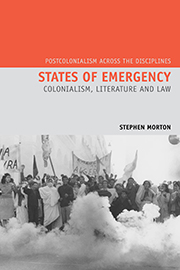
-
The digital format of this book is no longer available to purchase from Cambridge Core. Other formats may be available.
-
Select format
-
- Publisher:
- Liverpool University Press
- Publication date:
- Invalid date
- February 2013
- ISBN:
- 9781846318498
- Dimensions:
- Weight & Pages:
- 00kg,
- Dimensions:
- Weight & Pages:
You may already have access via personal or institutional login
Book description
How can literature and culture from the postcolonial world help us to understand the relationship between law and violence associated with a state of emergency? And what light can legal narratives of emergency shed on postcolonial writing? States of Emergency: Colonialism, Literature and Law examines how violent anti-colonial struggles and the legal, military and political techniques employed by colonial governments to contain them have been imagined in literature and law. Through a series of case studies, the book considers how colonial states of exception have been defined and represented in the contexts of Ireland, India, South Africa, Algeria, Kenya, and Israel-Palestine, and concludes with an assessment of the continuities between these colonial states of emergency and the wars on terror in Iraq, Afghanistan and Northern Pakistan. By doing so, the book considers how techniques of sovereignty, law and violence are reconfigured in the colonial present.
Reviews
Morton briefly reminds the reader of States of Emergency that it is even now, perhaps all the more, and more than a century after the “dynamite novels” that pulped the London literary and political scenery, necessary “to imagine a form of justice beyond the liberal fictions of human rights, democracy and the normal of law.”
Barbara Harlow Source: Research in African Literatures
Source: Year's Work in English Studies
Contents
Metrics
Altmetric attention score
Full text views
Full text views help Loading metrics...
Loading metrics...
* Views captured on Cambridge Core between #date#. This data will be updated every 24 hours.
Usage data cannot currently be displayed.
Accessibility standard: Unknown
Why this information is here
This section outlines the accessibility features of this content - including support for screen readers, full keyboard navigation and high-contrast display options. This may not be relevant for you.
Accessibility Information
Accessibility compliance for the PDF of this book is currently unknown and may be updated in the future.

